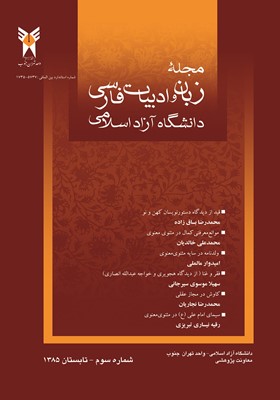کاوش در مجاز عقلی
محورهای موضوعی : اسطوره
1 - عضو هیأت علمی دانشگاه آزاد اسلامی ـ واحد یزد
کلید واژه: اسناد مجازی, مجاز لغوی, علاقه, مسندالیه, مسند,
چکیده مقاله :
در این گفتار ضمن بیان انواع مجاز، تعریفی جامع و مانع از مجاز عقلی ارائه و به علت نامگذاری، قرینه و علاقههای آن، اشاره شده است. سپس به جایگاه مجاز عقلی در علوم مختلفی چون معانی، بیان، کلام، زبانشناسی، تفسیر، فلسفه و نیز اینکه منظور از عقل، کدام عقل است، پرداخته و در این میان نظرات بزرگانی چون سکاکی، خطیب قزوینی، جرجانی، زمخشری، فخررازی، دکتر بدوی طبانه، دکتر شفیعی و دکتر کزازی مطرح شده است. در ادامه مباحثی از جمله نسبت در مجاز عقلی، اقسام این مجاز و نشانه برونی و درونی آن تبیین و در پایان نیز به بیان ایراد به تعریف سکاکی اشاره و سپس اعتراضات تفتازانی در رد مذهب سکاکی تحلیل شده است.برای تبیین بیشتر مجاز عقلی، شواهدی از قرآن و نهجالبلاغه و متون فارسی و عربی، گفتار ما را مزین کرده است.
In this article a comprehensive and exclusive definition of rational metonymy is presented. While naming the different types of metonymy, the reason why this type is known as rational metonymy along with its definition, symmetry and accompaniment will also be discussed. First, the meaning of “reason” is examined. Then the role of rational metonymy in different fields of knowledge such as rhetoric, theology, linguistics, interpretation and philosophy is explained, in the course of which the views of the masters such as Sakkaki, Khatib-e-Ghazveini, Gorgani, Zamakhshari, Fakhre Razi, Badvi Tabaneh, Shafiei Kadkani, and Kazzazi are brought up. Afterward, the relativeness of the rational metonymy and its inner and outer symptoms are explained and in the end the critique of Sakkaki’s definition is shown and then Taftazani’s critique of Sakkaki’s views will be analyzed. To further expound on the rational metonymy, some evidence are brought from the Holy Koran, Nahjol-Balaghe, and the Persian and Arabic texts.
_||_

